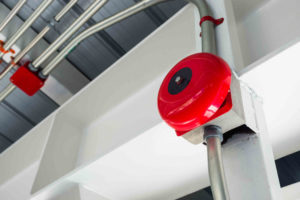
The fire alarm noises are louder than most because they warn everyone in the building that they must leave immediately.
Suppose you have experienced a live music concert or walked by a jackhammer in a construction environment. In that case, you know that exposure to loud noises can lead to potential hearing problems. And that includes fire alarms too. The fire alarm noises are more audible than most because they warn everyone in the building that they must leave immediately. So, how do you preserve your ears from the blaring sound? Read on for more information about fire alarms.
Noise Level of Fire Alarms
There are two primary forms of fire alarm notification appliances: audible and visible. Horns and sirens release the audible alert (65 to 120 decibels) when a person stands 10 feet from the device. In addition, strobe lights flash the visible alert once per second at 15 to 1,000 candelas. Never-ending and repeated exposure to loud sounds can permanently damage your hearing. Here are some noise examples for comparison to help you understand the loudness of various decibels:
- Indoor conversation is 50 decibels
- Conversations within a restaurant are 60 decibels
- A vacuum cleaner is 70 decibels
- Food blender is 80 to 90 decibels
- Motorcycle engine is 100 decibels
- Thunderclap is 120 decibels
- Jet take-off from 82 feet away is 150 decibels
Various Fire Alarm Volumes
Moreover, the precise requirement for fire alarms is 15 decibels above the average noise level or 5 decibels above the maximum ambient sound. What does this mean? It may be acceptable to control fire alarm horns to 75 decibels for a restaurant setting. Still, a warehouse facility with loud equipment may have to sound off closer to 120 decibels to determine whether the noise stands out from other ambient sounds.
Additionally, the decibel level must be higher than other sources to ensure the sound travels everywhere in a building. This accounts for the distance as the horn decreases its perceived volume, and building materials absorb noise, mainly if there are closed doors between rooms.
Ways to Protect Your Ears from Loud Fire Alarms
Moreover, your first instinct is to protect and cover your ears when you hear the high-pitched noise of a fire alarm. This is an effective way to protect against hearing loss while you calmly walk to an exit out of the building. However, it’s also essential to make a fire evacuation plan and practice regular fire drills. When you plan, you limit any confusion and lessen the time you’re exposed to loud sounds. Lastly, hire a fire protection company to inspect your fire alarm if you believe your fire alarm’s decibel level is too high.
Commercial and Residential Fire Prevention from Judd Fire Protection
If you want to ensure your home and business are safe throughout the year, trust Judd Fire Protection, LLC. We have over two decades of experience designing, installing, inspecting, and repairing residential and commercial fire protection systems. We serve clients throughout Maryland, Pennsylvania, Washington, D.C., Virginia, and West Virginia. If you are interested in finding out more about our services and protecting your home and business, give us a call at 410-871-3480
